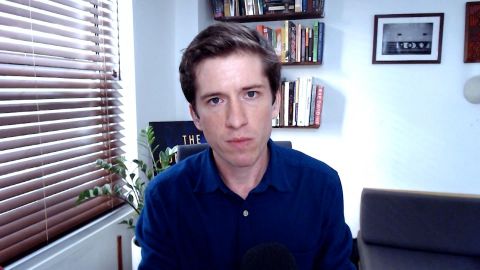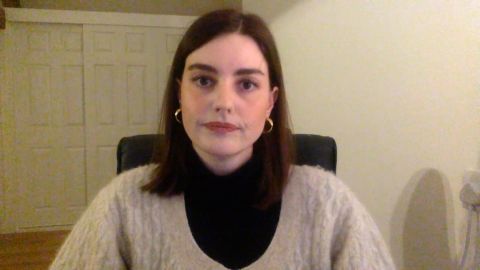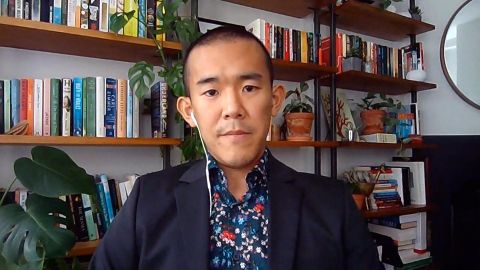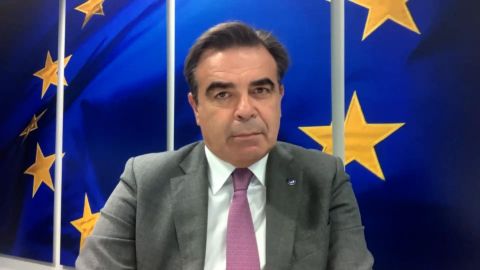Read Transcript EXPAND
BIANNA GOLODRYGA: Well, we turn now to Silicon Valley and one of its most influential investors. Venture capitalist Peter Thiel had a hand in the success of many of the most profitable tech companies from today, from Facebook to SpaceX. He’s also on a quest to live forever, investing millions in life extension research. It’s all down on paper in Max Chafkin’s new biography, “The Contrarian: Peter Thiel and Silicon Valley’s Pursuit of Power.” Here he is speaking with Hari Sreenivasan about the man behind the money.
(BEGIN VIDEOTAPE)
HARI SREENIVASAN: Bianna, thanks. Max Chafkin, thanks so much for joining us. You call Peter Thiel the most influential venture capitalist in Silicon Valley. Why?
CHAFKIN: Well, Peter Thiel, Thiel it has been behind some of the most important companies in Silicon Valley. So he’s the co-founder of PayPal. He’s the founder of Palantir, which is this gigantic defense contractor data mining firm that has more than a billion dollars in contracts from the U.S. government. And, probably most significantly, he is the first outside investor and the longest serving board member at Facebook. He is really the person who kind of made Mark Zuckerberg Mark Zuckerberg, who both set Facebook up with this structure that allows Zuckerberg to control the company at — basically as a de facto dictator. He controls the board of directors. He’s the founder. He’s the CEO. And he also kind of created this as a sort of ideology which has spread throughout Silicon Valley. And you see this structure and also kind of the Facebook approach to growth, which Peter Thiel really helped create, having kind of been deployed across the tech industry. And it has led to a lot of the tech industry’s amazing success over the last few years, but also, I think, some of the problems.
SREENIVASAN: Most people in America, if they know of him, they might have caught a glimpse of him during the Republican National Convention when he was on stage and he was endorsing Donald Trump. But you point out that that would be kind of an oversimplification of his politics. I mean, what is it that got him to that point?
CHAFKIN: Yes, so that — this is what makes Thiel so interesting, and probably — it’s like why I was interested in writing about him for this book, because he’s not just this tech guy, this guy who has kind of helped create Silicon Valley as it exists today. But he’s had this really interesting and really long, decades-long career in conservative politics. He got attention way back as the 1980s starting this newspaper called “The Stanford Review,” which is kind of a provocative right-wing newspaper, really similar to sort of “The Dartmouth Review,” which was Dinesh D’Souza’s paper, “Cornell Review,” which Ann Coulter was involved with. He wrote a book about the dangers of — quote, unquote — “multiculturalism” in the mid-’90s. He’s sort of always flirted with this kind of very provocative — this idea that the liberal establishment has gone too far, and these — and conservatives need to push back. And I think he really saw an opportunity with Donald Trump, who made that a core part of his candidacy. And, of course, Thiel, who is sort of a brilliant investor, is always one to spot an opportunity to buy low, got in on sort of on the Trump campaign, the Trump train, as it were, really early, making this — making his support known before most in the business world had gotten behind Trump, and then making a donation at a really crucial time during the 2016 election, shortly after the “Access Hollywood” tape had leaked. And many Republicans, especially in the donor class, were writing off Trump’s candidacy.
SREENIVASAN: You mentioned that, early on in his life, some of his — one of his colleagues or one of his co-workers had said that he was saying, you know what, the entire political system is all corrupt. And here he is playing this like a chess game, which you say he’s very good at.
CHAFKIN: Yes, yes, absolutely. And, I mean, there is this strain of kind of ultra-libertarian. I mean, it’s, like, a real bring-down-the-system kind of ethos that you see in Thiel. And also, many of the people who have come into positions of power in the tech industry and that’s kind of — again, that’s, I think, why he’s so interesting because it’s not — he’s not just the singular figure, he’s somebody whose ideas have proliferated. In the early — sorry, the late ’90s, you know, Thiel started PayPal, we think of PayPal as being this, you know, money transfer thing. It’s a way to buy stuff on eBay. And it is that. But back then, Thiel was talking about it as the kind of culmination of this libertarian project. He talked about, you know, this would be a way to let anyone have a Swiss bank account in their pocket. That it would hurt the viability of nation states. You know, these are super radical statements. And now, you have seen them cropping up actually, you know, in the world of crypto today. And they have really, you know, gone mainstream to some extent, but, of course, they are also kind of in conflict with some aspects of Donald Trump and Trumpism because Trump is — you know, he’s a nationalist and it’s all about, you know, America fist. So, you know, Thiel is kind of a swirl of contradictions at times, but has really been, you know, at — you know, had these like really radical philosophies.
SREENIVASAN: Tell us a little more about those contradictions. Because as you point out, I mean, on the one hand, the libertarian wants small government and on the other hand, his company is supporting the CIA and Homeland Security and many other government agencies.
CHAFKIN: Yes. I don’t think Thiel is a libertarian in any kind of a normal sense. He definitely supports some libertarian goals such, you know, the idea that billionaires should be allowed to pay less in taxes and that, you know, businesses should be allowed, you know, increasing freedom. You know, bordering on the freedom to kind of run the world. But Thiel has also been, you know, really far right on immigration, you know, kind of really in line with Donald Trump and Trumpism on immigration. And I think when you kind of add all this stuff up, one possible explanation is he’s — you know, he’s just adopted a lot of extreme positions that have allowed him to enrich himself. I mean, the libertarian position, of course, is a great way to pay less in taxes. His affinity with the Trump administration has been a really great — arguably, a really great asset to Palantir, his defense contractor that has won, as I said, you know, more than a billion dollars in contracts since 2016.
SREENIVASAN: You know, as you read the book, it’s like he’s almost like a Forrest Gump-like character. He shows up in all these moments in the lives of these tech companies and these entrepreneurs, which turn out to be pivotal. And they turn out to be huge. I mean, most people don’t know that there was a company called X.com that Elon Musk was running, which was literally in the same building down the hallway from Peter Thiel’s company. You know, he and Elon Musk, at one point, both were CEOs of PayPal. So, they don’t seem like they would get along.
CHAFKIN: No. And they don’t get along because there was a big blowup. I mean, this — there’s so many crazy stories, and I love the Forrest Gump analogy because like — it really is that way. I mean, following Thiel is sort of this alternative path through the history of Silicon Valley. You know, Musk and Thiel have this — have a relationship, sometimes it’s a friendship, but sometimes it’s more after a rivalry. And in 1999 and 2000, you know, they are both running these competing payments companies. The two companies merged. Musk took over and was running the company. And he was, you know, the better known of the two men. He had more investment dollars, more famous investors. He was, in many ways, the senior partner. And Peter Thiel, you know, being kind of a master chess player, and he was, you know, he was a chess champion as a boy, you know, engineers this coup where Musk flies to Australia for his honeymoon. And I think he maybe had a few investor meetings planned along the way. And when he comes back, he finds that the — that these allies of Peter Thiel’s have gone to Mike Morris, who the most — one of the most famous investors in Silicon Valley and presented him with an ultimatum which says, either replace Elon Musk with Peter Thiel or we walk. And the amazing thing about that story is not just Peter Thiel, you know, did a coup on Elon Musk, you know, the of two of the most famous people in Silicon Valley. But after that happened, they managed to kind of patch it up. And if you know anything about Elon Musk, he does not take slights lightly. But it’s really a comment on both Thiel’s — really on Thiel’s power that Musk saw that, you know, he would be better off with Peter Thiel as a friend than as an enemy. And years later, when Musk’s rocket company was struggling in 2008, it had a couple of unsuccessful launches, prospects look really deem, Peter Thiel comes along and makes an investment in SpaceX that helps save the Elon Musk’s rocket company and I would argue helped save Elon Musk’s, you know, business empire, really, because he was in a very difficult place. And so, of course — and that’s just like another one of these weird influences that Thiel’s managed to have, you know, not only over his friends but over these people who, you know, he’s had one over on.
SREENIVASAN: So, tell me about how it is that he becomes the first big backer of Mark Zuckerberg.
CHAFKIN: Yes. So, Thiel is the leader. If you spend time in Silicon Valley, you’ll hear this phrase, PayPal mafia. That’s the former group of former PayPal executives basically led by Peter Thiel. After the — after eBay purchased PayPal, they sort of went off into Sillicon Valley and started working together, making investments, basically in each other’s companies and companies of friends and you’ll see employees bouncing from one company to the next. The network is not — you know, it’s called a mafia, but it’s not a violent network, but it is a network where loyalty and both in terms of business loyalty, but at times kind of ideological loyalty. A lot of these guys have kind of the same politics, really is valued. And that loyalty also includes, of course, not talking to the press, which was made my life a little bit difficult. Zuckerberg comes to Thiel through that network, through this guys, Reid Hoffman, who was a senior executive at PayPal who then founded LinkedIn and he had this meeting with Zuckerberg and, you know, at the time, Zuckerberg didn’t really look like much, right? He had been sort of run into trouble at Harvard. He was this kind of bad boy who had done something vaguely — you know, not criminal, but certainly not following the rules. And Thiel is somebody who kind of loves these people, loves these provocateurs, these guys who get in trouble at elite institutions like Harvard and sees, you know, very quickly not only that Zuckerberg, you know, was on to something, but that Facebook had a lot of potential. And he helps Zuckerberg develop a strategy, which is this kind of — you know, it’s like the Roman empire. You know, Zuckerberg tried to grow as quickly as possible, as fast as possible to dominate this network, you know, that is Facebook. And ultimately, of course, succeeded. You know, 3 billion users, I think it’s, you know, fair to say that Facebook is the most powerful, you know, media company in human history.
SREENIVASAN: What’s intriguing to me is what were the effects that Peter Thiel had beyond the just investment of cash into Mark Zuckerberg? Because in a way, you see some similarities in them, how they think of the world, where they think of their product, what they think is the acceptable and not acceptable reach of government.
CHAFKIN: Yes, absolutely. Yes. That’s — and that’s why Thiel matters because he’s — it’s not just a money man. Because if it was just a question of money, you know, he isn’t that rich, you know, he has maybe $10 billion, maybe a little less. You know, I’m saying rich compared to, you know, Jeff Bezos or something or Zuckerberg. But he did create this business philosophy. And the philosophy is basically, you know, the philosophy of disruption. It’s the idea that companies should grow as big as possible, as quickly as possible, Thiel talks about monopoly not as, you know, something to be avoided, you know, as — which has kind of how most capitalists think about it, but as the end point of business. The thing that all entrepreneurs should strive for, which is a really, you know, radical kind of far out there suggestion. And he also talks, you know, at some length about the importance of bending the rules, of breaking norms. And it’s not just that the norms — it’s not just that breaking the rules is something that happens incidentally where, you know, you’re — you accidentally run afoul of the law. It’s almost that doing so is a good thing and that it creates some virtue. And I think that is something that we definitely seen kind of play out over and over again, not just with Facebook, but with many of these big companies.
SREENIVASAN: And there’s also a lot of movement right now to try toing regulate big tech. And interestingly, Peter Thiel is putting money behind some of the very candidates that could threaten, for example, well, him sitting on the board of Facebook, right, which would be a big tech company that would be squarely in the radars of Congress if this kind of thing passed.
CHAFKIN: He’s backing these two Senate candidates, one in Arizona and one in Ohio and they are both turning, you know, Mark Zuckerberg into a political punching bag. So, I think it’s an interesting question to ask, you know, why is he still on the board of Facebook. And I think there are a couple different possible explanations, but one thing he’s been able to do on the board of Facebook is kind of nudge Mark Zuckerberg in this political direction, in the direction of, as conservatives see it, you know, not discriminating “against conservative world views.” And, of course, being on the Facebook board, you know, is an important position of influence and power. During the Trump administration, he was able to kind of serve as this broker between Mark Zuckerberg and Donald Trump, arguably like the two most powerful people in the world or two of the most powerful people in the world.
SREENIVASAN: Thiel’s personal wealth has also come into the spotlight recently. A lot of us are familiar with what an IRA or a Roth IRA. I mean, we stock away a little bit every month, if we can. And his account has billions of dollars in it. And all of the profits that it’s making will be tax free. How did we get to that?
CHAFKIN: Yes. So, that is a quirk of the Roth IRA, which is this kind of really not a — pretty much little noticed investment — kind of an investment account that was created in the ’90s. You used post tax dollars and any gains are tax free. And as originally created, the Roth was for kind of middle-class and lower middle-class taxpayers. This was not supposed to have a huge impact on the — you know, on the IRS’s ability to collect tax receipts, especially not tax receipts from billionaires. But Thiel, you know, very savvy operator, you know, an — you know, just like a brilliant chess player, sort of figured out that there’s this quirk which is that start-up founders can get chairs at a very low price. You know, low enough so that he was able to acquire a significant chunk of PayPal inside of his Roth IRA while still not violating the rules around contribution limits. Because the contribution limits at that time were just $2,000 a year. And that money, you know, grew enormously. And he eventually used some of those gains to buy shares in Palantir, you know, founding shares in Palantir and to buy shares in Facebook and probably to buy shares in other companies. And so, he now has this enormous nest egg, you know, at least $5 billion as of 2019. It’s probably quite a bit bigger now. And according to the tax rules as they’re written and if the interpretations of the way that Thiel did this, you know, don’t change, he’s never going to pay taxes on that. And that, I think, is — I mean, it’s — depending on your point of view, again, it’s an outrage. It’s a case of, you know, kind of oligarchic behavior or, you know, from Peter Thiel’s fan though, of course, who think, number one, that the system is broken, number two, that billionaires should be allowed more leeway, it’s something to be applauded. It’s like he got one over on the tax man. And we have seen this structure has been copied by lots of other people. So, you know, people are talking about reforming it and there are bills in Congress that could affect the Thiel’s, you know, tax liability. There are also shifts, again, in how they interpret these rules that could potentially impact Thiel. But it’s not just Thiel who would be affected. It would be a bunch of very, very angry Silicon Valley billionaires. So, it would be a formidable fight if it happens.
SREENIVASAN: It’s evident from reading the book that you spent a lot of time reading his articles, articles from the Stanford Review, lectures that he’s given and so forth. And he’s a pretty famously private person. And I wonder what sort of cooperation or lack thereof there was in sitting down with him for the book.
CHAFKIN: Yes. So, I approached this project, you know, journalistically. Meaning, I tried to talk to anyone who had worked at his companies, who had — who knew him well, his friends, his former classmates and, of course, Peter Thiel himself. And I approached, you know, his PR people early on in the process and we had a lot of back and forth. And there was ultimately an off the record meeting with Peter Thiel, but he did not comment on the record. And that’s kind of in keeping with his general position towards the press, which is he’s kept the press kind of at arm’s length. He has tried to, you know, I think, it’s fair to say, manipulate the press in various ways, both in terms of positive — you know, sort of positive manipulation creating this image of a — you know, (INAUDIBLE) Randy and Superman and also, of course, the sort of more, well, you might think of as negative manipulation in terms of his, you know, long running battle against Gawker.
SREENIVASAN: The book is called “The Contrarian: Peter Thiel and Silicon Valley’s Pursuit of Power.” Max Chafkin, thanks so much for joining us.
CHAFKIN: Thank you.
About This Episode EXPAND
The European Commission’s Vice-President discusses the migrant crisis. The Atlantic’s Ed Yong explains how we can prepare for the next pandemic. “Sex Education” creator Laurie Nunn discusses the show’s third season.
LEARN MORE



